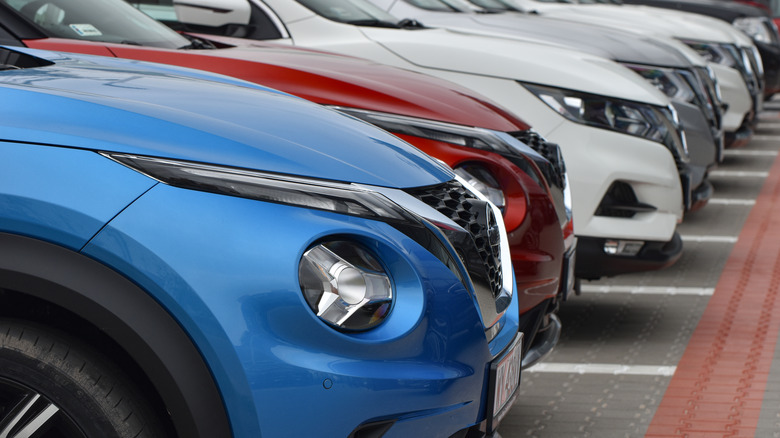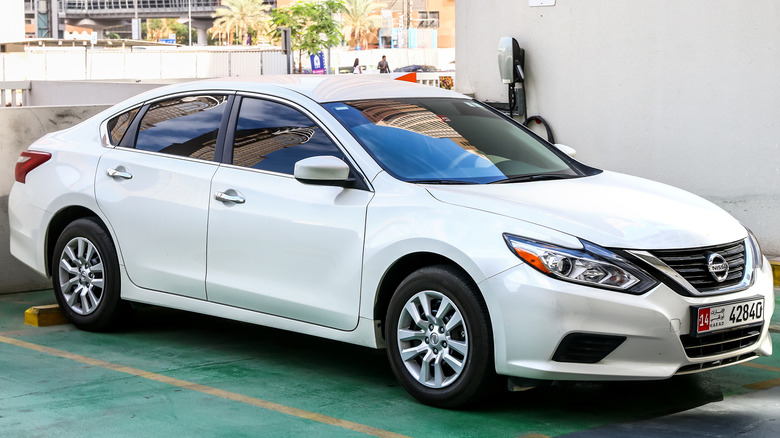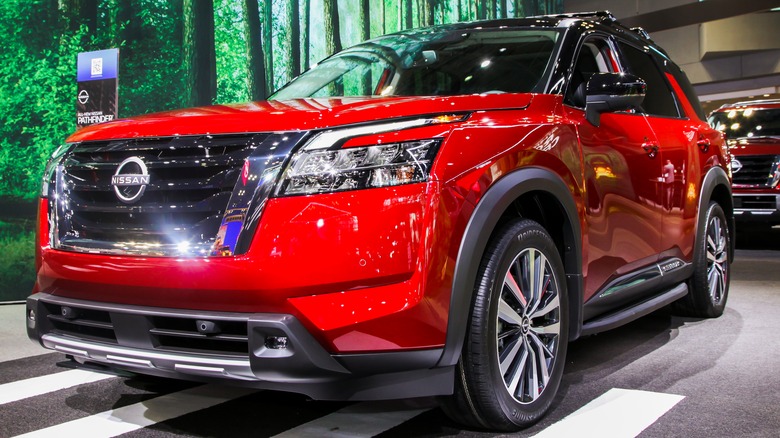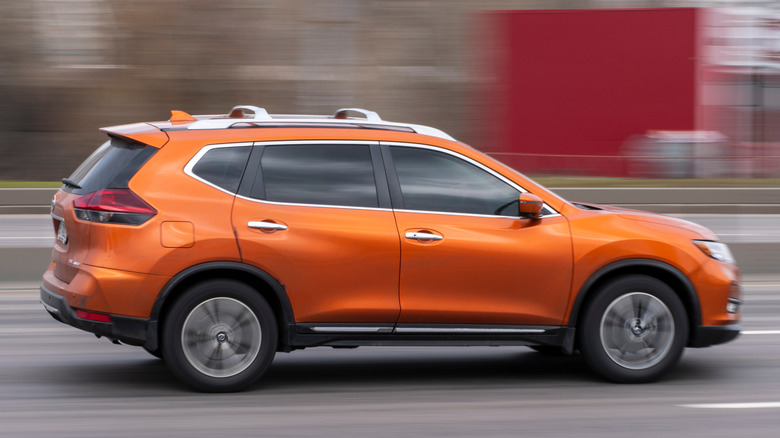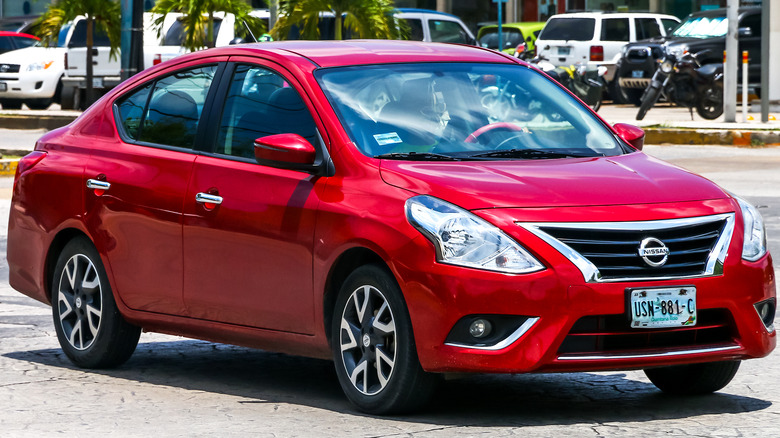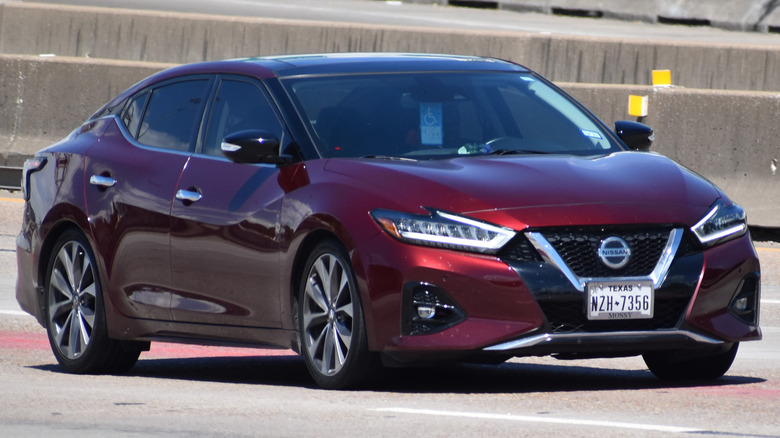5 Of The Most Unreliable Used Nissans To Stay Away From
Nissan is one of the most popular car manufacturers in the U.S, and offers a large variety of vehicle types. If you're shopping for a pre-owned vehicle, you'll have plenty of options, because several of its models have been around for generations. With that wide range of choices, however, comes a range of quality, and you're going to want to make sure the used Nissan you buy isn't going to be a lemon.
There are a few good metrics you can use to determine the reliability of an older model. This includes a history of recalls, assessments composed by organizations like Consumer Reports, and the PainRank scale developed by CarComplaints.com — which uses first-hand data by actual owners and drivers of the vehicles to measure the reliability of a given model.
Even brands considered generally unreliable may have a few bright spots, as each generation is built differently from the ones before and after. Interestingly, some Hybrid models of even Nissan's worst offenders — like the Rogue, Pathfinder, and Altima — rate much better than their ICE versions. To help sort through all the information, here are the most unreliable used Nissans you'll want to stay away from when purchasing a car.
Nissan Altima
When comparing the PainRank scores compiled by CarComplaints.com, the Altima rates dead last of all Nissan models, and it isn't even close. In the past two decades, the Altima has become notoriously unreliable.
While models from the 1990s were generally okay, for whatever reason, the third, fourth, and fifth generations of the Altima (produced from 2002 to 2018) are all beset with multiple problems. Altimas made from 2013-2018 are especially trouble, with issues and recalls ranging from headlights to front hoods randomly popping open while driving.
Buyers would have to go to either end of the Altima's lifespan to find a used model worth buying. The first generation Altima, produced from 1993-1997, has some engine and electrical concerns, but generally rates okay. Likewise the sixth generation, which includes the 2019 and 2020 models, ranks fairly high on CarComplaints.com's reliability rankings — with some reported issues with its windows and transmission.
Nissan Pathfinder
The Nissan Pathfinder has been one of the most popular SUVs in the U.S. for a while now, but that doesn't mean it's not without its problems. Buyers should especially avoid purchasing any pre-owned Pathfinders from 2005-2012, because that third generation of vehicles is more problematic than any other. Several models are at risk of the infamous "strawberry milkshake," a serious gearbox issue caused by transmission fluid mixing with coolant within the radiator.
While the Nissan Pathfinder is generally a roomy and relatively quiet passenger SUV, it's not the ideal off-road vehicle. If you're looking for a used SUV intended for more rugged terrain, you're better off looking for another brand, especially when also factoring in the Pathfinder's mechanical issues and recalls.
However, if you've got your heart set on owning a used Nissan Pathfinder, its first generation (produced from 1987-1995) has aged well, and has far fewer driver complaints than its younger siblings despite being on the road for far longer.
Nissan Rogue
There are a lot of Nissan Rogues in the pre-owned market. In 2017, the Rogue was Nissan's top-selling brand, and sold very well in the years before and since as well. But the model has generated lots of driver complaints along the way, so don't be surprised if you see many of these owners trying to offload their vehicles onto other buyers.
According to CarComplaints.com, transmission and HVAC problems drive the majority of consumer dissatisfaction with the Rogue. The Rogue's first generation is especially problematic, with powertrain and suspension recalls included alongside the other noted issues.
This series of Rogues was produced from 2008-2013, and you'll want to avoid buying any model years from this period. The second generation Rogue came off the assembly line between 2014-2020, and fares only slightly better than its predecessor.
However, other Nissans sharing the Rogue moniker may be worth your money. The Rogue Hybrid has largely avoided consumer complaints, and would be a smart buy for a used vehicle. The Rogue Select and the Rogue Sport (known as the Qashqai J11, outside of North America) rest somewhere in the middle of the reliability rankings — between the Hybrid and the problematic models. Keep in mind that, if you do go with a Rogue Sport or Rogue Hybrid, you'll likely pay a little more, considering they've only been on the road a few years.
Nissan Versa
With the automotive market in the U.S. shifting largely away from subcompact vehicles in favor of crossovers, SUVs, and other larger vehicles, buyers might have a tougher time finding a smaller used Nissan these days. One model often seen is the Nissan Versa.
If you come across a used Nissan Versa, make sure your guard is up and you test drive it thoroughly before deciding to purchase it, because it's one of Nissan's least reliable brands. Its first two generations have been subject to multiple recalls, including for safety features like seat belts and airbags, as well as defective power trains, ignition, GPS, and service brakes.
Some may think the Versa Note might be a better option, but they'd be wrong. The variant model hasn't been immune to recalls either, with similar issues to its ignition and airbags, as well as problems with body and mid/rear assembly. The Versa Note was discontinued in North America, so while they may be harder to come by on the used market, that doesn't necessarily make them more valuable or reliable.
Nissan Maxima
Nissan has been making the Maxima for over 40 years, and you'll almost certainly spot one on the road on any given road trip that's longer than a few minutes. However, quantity does not denote quality in this case. With so many generations and models, the reliability of Nissan's flagship sedan varies greatly.
Buyers will want to avoid any models from the sixth generation Maxima, produced from 2004-2008. Not only does it have mechanical issues with its transmission and torque steer, but for whatever reason, its sticker price hasn't come down much to reflect its downsides or its age. You'll likely be paying more than it's worth when compared to more reliable Maxima models.
Any buyer can find more reliable Maxima models if they look for older cars. Model years 1989-1999, the Maxima's third and fourth generations, are generally solid (if a bit old). However, the exception to this "older is better" trend is Maxima's eighth generation. Its 2016-2020 model years score well for reliability, and the complaints they've accrued are relatively minor, concerning trunk space and navigation issues.
